We've updated our Privacy and Cookies Policy
We've made some important changes to our Privacy and Cookies Policy and we want you to know what this means for you and your data.
Beddington: GM protests threaten world's poor
- Author, Pallab Ghosh
- Role, Science correspondent, ΒιΆΉΤΌΕΔ News
Attempts to hamper the development of GM crops threaten the future of the poorest of the poor, the government's chief scientist has said.
Professor Sir John Beddington said GM crops were needed to meet increased demand for food over the next 15 years.
He made his comments as demonstrators gathered to protest against the planting of GM wheat in open fields at Rothamsted research institute, Herts.
Professor Beddington said that a more rational debate was needed.
"We have to think about the future," he told ΒιΆΉΤΌΕΔ News. "The future is really quite frightening. We are going to see enormous increases in the demand for GM food and who's going to suffer when the food prices go up? The answer is the poorest of the poor".
Professor Beddington is the government's most senior scientific adviser. In recent years he's drawn attention to the consequences of a combination of climate change, water shortages, changing land use and a growing population conspiring to create what he describes as a "perfect storm".
He believes this "storm" could threaten the health and welfare of hundreds of millions of people in coming years. He believes that science and technology can avert a catastrophe and that GM crops should not be ruled out as a means of boosting food production.
An independent report commissioned by Professor Beddington found that two billion people were malnourished. The Foresight Food and Farming report concluded that there would be problems in meeting increased demand for food by a growing population.
"In 13 years there will be another billion people on the planet - half of those people will be living in Africa," said Prof Beddington.
"So how are we going to feed them? GM isn't going to feed them all. It's not going to solve the problem instantly. But it's part of the sort of developments we are going to need to use to address some of these formidable problems.
"It's one of a set of technologies that we are going to need to use which gives us some hope of solving some of these enormous problems."
<bold>'Natural pest control'</bold>
Professor Beddington said that 13 years ago, when protests against GM crops were at their height, there were genuine uncertainties about GM crops. But since then, he said, testing regimes had been developed to mitigate any risks to human health or to the environment.
"Our current system of agriculture, which involves enormous use of pesticides and enormous use of fertiliser, is not going to be sustainable," he said.
So when we have - as we do with this wheat that's being developed in Rothamsted - something that acts as a natural pest control and has the potential to reduce significant pesticide use and improve biodiversity then that seems to me an admirable technology and of the sort I'd like to see developed.
Opponents of the trial at Rothamsted argue that genes from the modified strain could spread into neighbouring fields, and that there has been no evaluation of whether foods made from the GM variety would be safe to eat.
But researchers say the chances of contamination are very small and that the disruption of experiments hampers the acquisition of vital information about GM crops.
Follow Pallab <link> <caption>on Twitter</caption> <url href="http://twitter.com/#!/@bbcpallab" platform="highweb"/> </link>
Top Stories
More to explore
Most read
Content is not available








